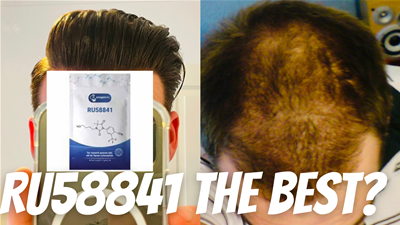Topical anti-androgens seem to gain popularity within the last year or so. Topical dutasteride and finasteride have become staples in many hair loss sufferers' protocols. Many world-renowned hair transplant surgeons believe topical anti-androgens will become the gold standard in the future, which leaves many questioning where RU58841 falls in efficacy and safety. In this article, we will be talking about RU58841 as a treatment for hair loss and how it compares to other topical anti-androgens.
What is RU58841
RU58841 (RU) is a nonsteroidal antiandrogen developed in the 1980s by a French pharmaceutical company. Initially, the drug was named ProStrakan while it was under investigation for androgen-related conditions such as acne, genetic hair loss, and excessive hair growth. Unlike Finasteride and Dutasteride, which are 5-alpha reductase inhibitors, RU does not inhibit DHT systemically. This makes the medication appealing to those who have suffered from side effects for inhibiting their DHT systemically.
How Does RU58841 Work?
A study published in the Journal of Dermatology compared the efficacy between topical RU58841 and oral finasteride. The researchers did not use human subjects but rather used bald monkeys, which should be noted because the results may vary with humans. The researchers placed the monkeys in different groups the placebo, finasteride, and RU groups. At the end of the clinical trial, they noted an 88% increase in hair growth from the finasteride group and a 103% increase in hair growth from the RU group.
The researchers tested the levels of serum DHT within the monkey's body. They noted a decrease in systemic DHT and an increase in testosterone from the finasteride group. However, the RU group didn't have any reduction in systemic DHT or testosterone.
Studies on humans were conducted in the early 2000s. The first phase took 30 men with male pattern baldness and applied a 5% solution twice a day, similar to the minoxidil protocol. However, the odd thing is that the results of this study were never published, but a second phase trial still went through. The phase II trial compared a placebo group to a group-administered 2.5% and 5% topical solution. Like the first trial, the results of this study were never published. There was a plan to launch a phase III trial; however, that never came to fruition. Many have speculated that the drug has a short shelf life and that the drug's side effects were too high to pass FDA approval.
RU58841 Side Effects
Unfortunately, because the clinical trials were never publicly published, we only have online are purely anecdotal. However, the most common side effects reported are as follows:
*Low Libido
*Erectile Dysfunction
*Heart palpitations
*Fatigue
*Insomnia
*Dermatological skin conditions, i.e., rashes, skin irritation
Topical Finasteride, Dutasteride Vs. RU58841
The real question is whether RU is more effective than topical finasteride and dutasteride for hair loss. Unfortunately, since no studies are comparing the three, we can only speculate. RU appears to be a powerful antiandrogen. While studies on animals showed no inhibition of DHT systemically, the reality is probably different for humans. Given that the studies from ProStrakan were never published and the compound was essentially abandoned, the results can't be that good. You will find many users from online hair loss forums claiming that RU is a life-changing medication. Still, there appears to be a lower incidence of side effects with topical finasteride and dutasteride. That said, all of the reports are online and anecdotal.
There are plenty of studies showing that topical finasteride is almost as effective as the oral version. Topical dutasteride hasn't been out as long, but the reports are even better than finasteride. Hopefully, there will be more information out on these two treatments soon. As more leading hair restoration physicians begin to compound the drugs for their patients.
Conclusion
While there seem to be good testimonials online with RU58841, the truth is it doesn't seem to be any better than topical finasteride or topical dutasteride. The compound has been around for over thirty years, and the pharmaceutical company essentially abandoned the compound. Now, some may speculate that it's because of efficacy, while others may speculate it's because of the side effects. The fact remains that the drug hasn't been studied enough. There are better alternatives like Breezula, topical finasteride, and dutasteride, which each have published clinical trials.

